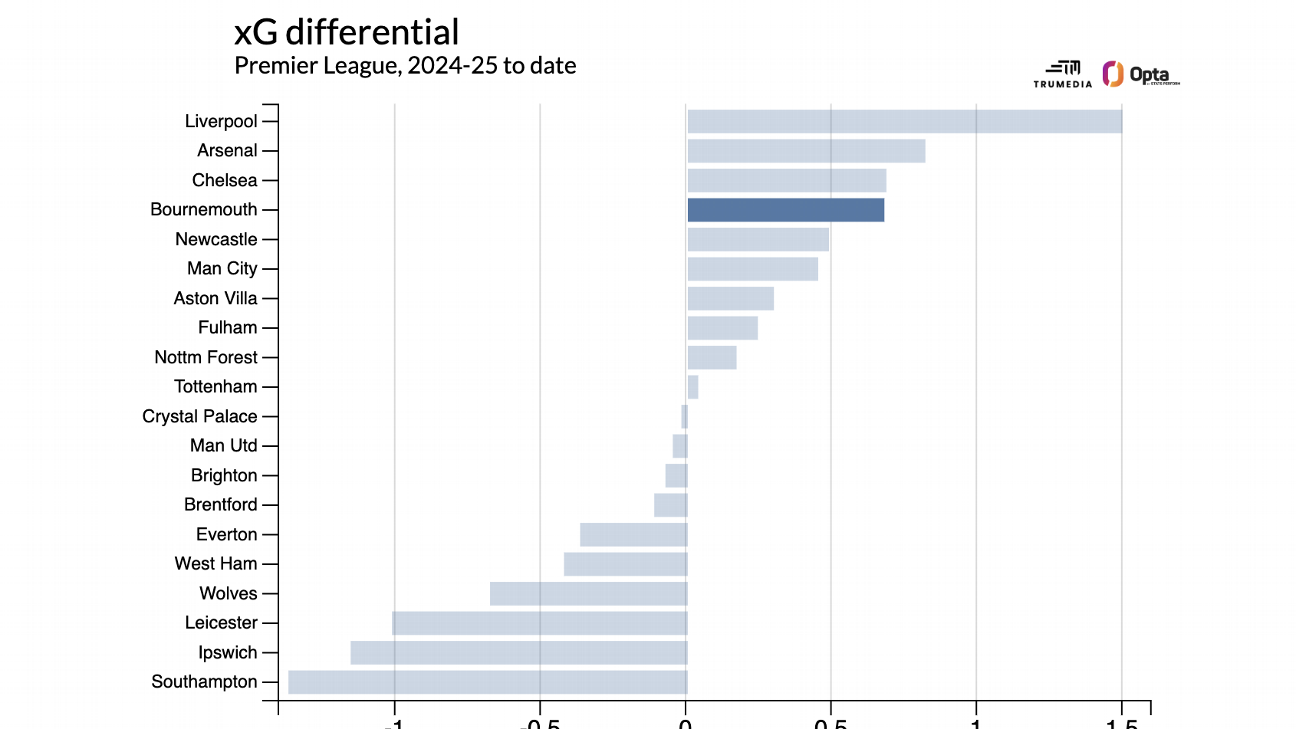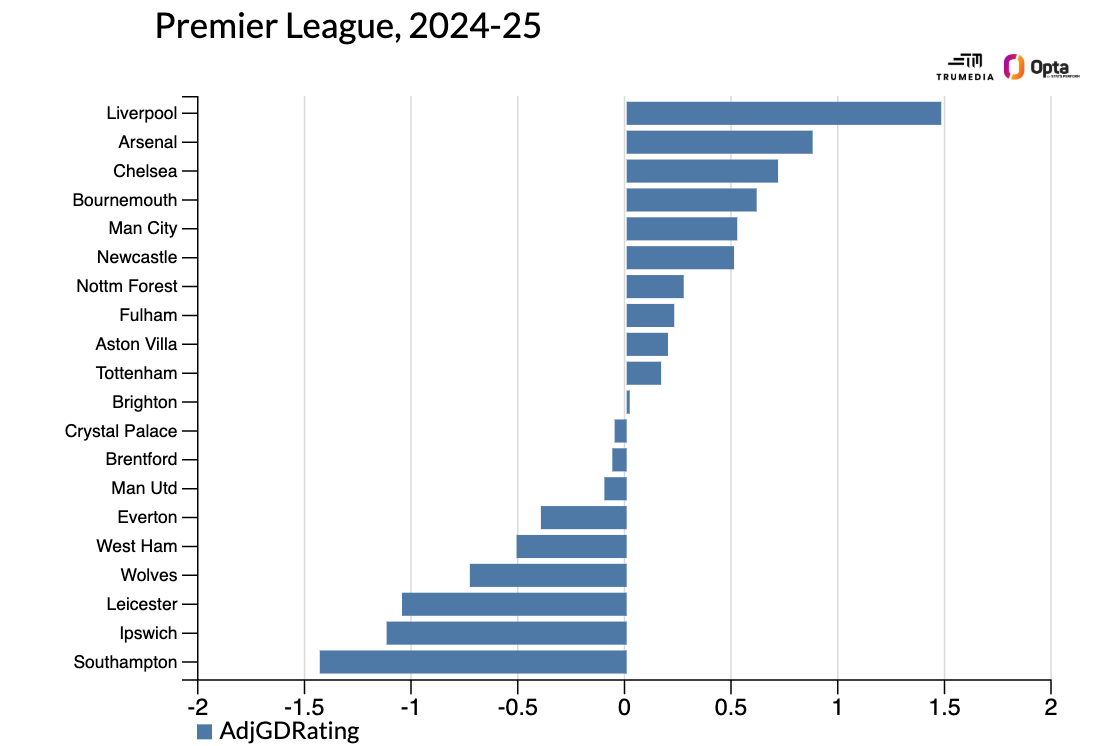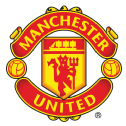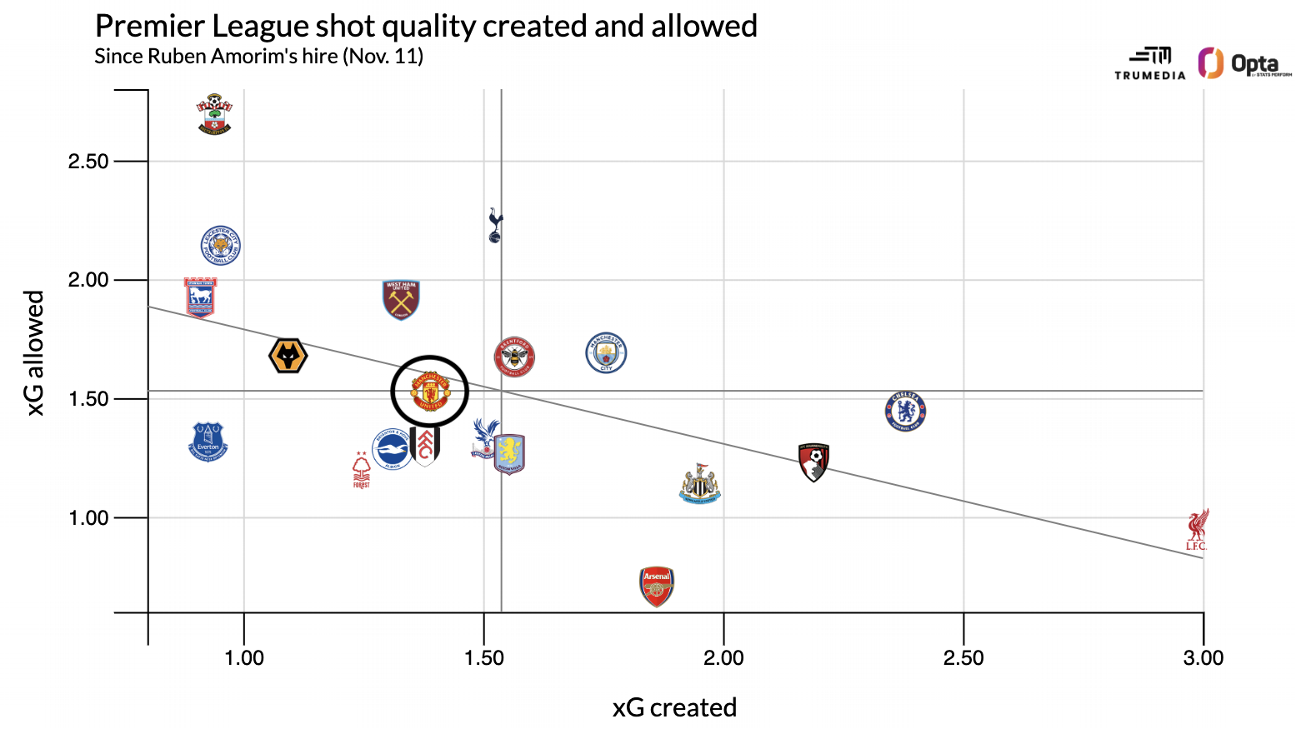Everything -- and nothing -- has changed since we last did this all-teams Premier League ranking two months ago.
Liverpool remain in first, while the three promoted teams are still the three teams at the bottom of the league and in our rankings. For the two most consequential positions in the table -- who wins the whole thing, and who gets kicked out of the league -- our expectations are exactly the same as they were toward the end of November.
As for everything else? Oh boy. Manchester City? Manchester United? Tottenham? Bournemouth? Nottingham Forest? Nobody expected any of this (except for, maybe, the Manchester United part).
Now that the festive fixtures, the midway point of the season and most of the January transfer window are in the rearview mirror, Ryan O'Hanlon and Bill Connelly are back to reassess all 20 Premier League teams from top to bottom. They both ranked all 20 teams and then combined their rankings to produce the master rankings. As always, the criteria is who they think would win a match if any of these teams played each other on a neutral field in the near future.
The updated rankings are below, followed by some analysis of the most notable changes (or non-changes) from the previous edition of our rankings, including why Man City's desperation is growing, Man United and Tottenham are in free fall, and Bournemouth and Forest are for real.
The updated Premier League team rankings
The January and November rankings -- the combination of Bill's and Ryan's individual rankings -- are listed along with the new adjustments, plus each team's present points total on the Premier League table and goal differential:
 Manchester City need to move -- fast
Manchester City need to move -- fast
"We are really pleased, we are back to doing things that define this team for the last 10 years."
It's not like we haven't heard Manchester City manager Pep Guardiola say things like this before. City have hit rough patches in the past. Key players have aged out of their ability to remain key players, the team's performance dropped, then Pep made some tactical tweak and boom: They resumed blowing all of their opponents off the pitch.
Perhaps the above quote came after a win against one of their fellow title favorites? Maybe he said it in the afterglow of a Champions League victory against someone like Barcelona or Bayern Munich?
Nope! That quote came after a blowout win against Ipswich Town, the preseason favorite to finish the season at the bottom of the table. Unfortunately for Pep, your "back"-ness cannot be reestablished against one of the worst teams in the league. And while City have climbed back into Champions League contention, they really haven't produced a dominant match -- one where they out-create their opponents by an overwhelming degree and also, you know, win -- since they beat Nottingham Forest 3-0 at the beginning of December.
They know it, too -- why else would they be signing four (and possibly more!) players in January?
While there are plenty of questions as to how Man City's new signings will translate to the Premier League and to Pep's demanding personnel requirements -- the same kind of questions that circle any transfer from one league to another -- there is one clear trait that makes these players different from the ones currently at the club: They're fast.
The data company PFF FC derives a number of physical statistics from broadcast data. The easiest to understand is maximum speed. It's the average of each player's maximum speed (in kilometers per hour) over his five fastest games. By this metric, Erling Haaland is the fastest player in the Premier League (35.59 km/hour). Four other City players rank in the top 100 -- Kyle Walker (25th), Josko Gvardiol (43rd), Savinho (59th) and Matheus Nunes (67th) -- but Walker is likely leaving the club this window, and Nunes clearly isn't good enough to play for Manchester City.
Of the three signings immediately joining the club this winter, all of them would rank among the 100 fastest players in the Premier League. The slowest of the trio, 19-year-old center back Vitor Reis from Palmeiras, would rank 69th based on his maximum speed in Brazil. Then there's Eintracht Frankfurt forward Omar Marmoush, who would rank 57th based on his max pace in the Bundesliga.
They're all plodders, though, compared to the 20-year-old hybrid defender from Lens, Abdukodir Khusanov. Khusanov's maximum speed in Ligue 1 (35.47 km/h) would be the second fastest in the Premier League after Haaland. Khusanov is significantly faster than Walker, and he's nearly 4 inches taller.
While we typically don't associate Guardiola's brilliantly technical teams with physical traits, their issues this season have been physical: injuries and then an inability to keep up with faster and stronger Premier League teams whenever the ball gets into open space. Based on the signings they've made so far this window, Pep and Man City know that if they are ever going to get back to where they once were, they'll need to move at a faster pace. -- O'Hanlon

 Forest and Bournemouth aren't going away
Forest and Bournemouth aren't going away
The success of pure spending power in this sport is such that sometimes we don't enjoy underdog runs as much as we should. We just assume that history and pure cash will eventually take over, and that underdogs will fall short -- and we're almost always right. But we continue to hedge on the success of Nottingham Forest and Bournemouth this season, and they continue to win matches.
Since a 3-0 loss to Manchester City on Dec. 4 -- their third loss in four matches -- Forest have taken 22 of a possible 24 points during an eight-match unbeaten run. The Premier League is almost assured of earning a bonus fifth spot in the Champions League this season, and per Opta's power ratings, Forest now have a 62% chance of finishing in the top five. Beyond that, they have an 88% chance of finishing in the top seven, meaning a European journey is likely on the way in 2025-26.
They continue to be the masters of seeing games out -- they've played in 14 matches decided by 0 or 1 goals, and they've taken 29 points from them, a 2.07 points-per-game average that leads the league (and might be unsustainable) -- and they're getting basically a goal per game from the ageless Chris Wood, who has scored in four straight league matches and is fourth in the league with 14 goals. This counterattacking squad doesn't have as many different paths to goals as the Liverpools of the world might, but the 33-year old Wood continues to find space in the box, usually just to the goalkeeper's right, and he continues to stick the ball in the net.
Meanwhile, since a 2-1 loss to Brighton on Nov. 23, Bournemouth have taken 22 of a possible 30 points during a 10-match unbeaten run. Over the past two months, they've averaged as many points per game as Liverpool and Arsenal and fewer than only Forest. They're seventh in the table, and the fact that they're fourth in expected goal (or xG) differential suggests that they're almost unlucky to not be in even better shape.

Bournemouth have only once finished higher than 12th in the Premier League, but Opta gives them a 27% chance of finishing in the top five and a 64% chance of finishing in the top seven. They aren't as safe as Forest, but Bournemouth -- from a city of under 200,000 people with a stadium under 12,000 capacity! -- are slowly closing in on continental play.
It's honestly incredible. Manager Andoni Iraola has given them everything they possibly could have hoped for after he was hired away from overachieving Rayo Vallecano. This team counterattacks more than anyone in the league (including Forest), but that's part of a general ethos of just running as much as possible.
Bournemouth average the most possessions per match (94.0) and the most ball recoveries (50.8), their direct speed (the average number of meters per second that the ball travels up the pitch in a given sequence) is lower than only Forest's, and they bait their opponents into playing frantically too. Their direct speed allowed is second highest behind only Liverpool.
Bournemouth are going to run, they're going to make you run, they're going to draw penalties from frantic defenders in the box, and they're going to win the set piece battle. And they're winning despite youth: Not including goalkeeper Kepa Arrizabalaga, of their 11 players with at least 1,000 league minutes, eight are 25 or younger, and only one is 30 or older. And that sample doesn't even include 25-year old American Tyler Adams, who has worked his way back into the rotation nicely after a back injury. This is a story we probably aren't talking about enough. -- Connelly
 Who's to blame for Tottenham's free fall?
Who's to blame for Tottenham's free fall?
There are two main problems with Tottenham's season, which looked so promising in November and has since completely fallen apart. Well, three problems. The first: It's late January, they're one of the 10 richest teams in the world and they're only in 15th place in their own domestic league. But there are then two reasons that first problem exists.
The first: everyone is hurt. We'll run through it from back to front. Last season, Guglielmo Vicario was one of the better shot-stoppers in the league, and he played every single minute in his first year in the Premier League. This season: He has played only 54.5% of the minutes, and that number is only going to decrease thanks to an extended spell on the sidelines with an ankle injury.
One way you might be able to face playing with a backup goalkeeper for half the season would be with excellent and consistent play from your center backs. Instead, both of Tottenham's first-choice center backs have played even fewer minutes than Vicario. Cristian Romero played 81.6% of the minutes last season; this season he's down to 49.2%. Romero's partner, Micky van de Ven, has dropped from 68.4% of the minutes last season to 39.8% this season.
OK, fine, but maybe you can scrape just enough performances together with a makeshift keeper-center back triangle if you've got some ground-eating, ball-dominating midfielders in front of them? Well, uh, Tottenham's two holding midfielders, Yves Bissouma and Rodrigo Bentancur, have each played fewer than half of the available minutes, too: 48.9% and 34.7%.
All right, sure, but everything that happens elsewhere on the field is at best poorly understood and at worst magic. Elite attacking play can make up for lackluster midfield and defensive performances, right? Just look at Liverpool during that 2020-21 season! So, Liverpool had Mohamed Salah, Sadio Mané, Roberto Firmino and Diogo Jota. Spurs have Brennan Johnson (75.4%), 32-year-old Son Heung-Min (71.0%) and Dominic Solanke (80.7%). Johnson and Solanke have, at most, two combined seasons of high-level Premier League performance between them, while Son, still the team's best attacker, has played significantly fewer minutes this season than last (85.8%).
Despite all of that, this Spurs team still shouldn't be in 15th. There's probably not even anyone in Australia who would claim that the level of available talent at Tottenham is the 15th best in the league. And so, even with the injuries, doesn't that mean manager Ange Postecoglou's job should be on the line?
Perhaps if they were actually playing like the 15th-best team in the league. And that brings us to the second problem with Tottenham's season: Over a sample of 20 or more games, we know that sometimes performances still don't equal results. The best predictor of actual team strength is a blend of about 70% expected goals and 30% actual goals. And by that, Spurs have been significantly better than the 15th-best team in the league:

You've got Liverpool in their own tier at the top, Arsenal in their own tier in second, and then a third tier with Chelsea, Bournemouth, Manchester City and Newcastle. Coming into the season, the second tier was Tottenham's best-case scenario -- instead, they've had a massive injury crisis and fallen down into the third tier. That's been obscured by some freak luck in close matches, but should we really be expecting much more than that?
This isn't to say that Postecoglou has been perfect or even above average. The talent is performing at its level -- not above it. And it'd be naive to call all of these injuries bad luck. Per PFF FC, this team covers more ground per match than every team other than Bournemouth, who are currently going through their own injury crisis. Postecoglou's preferred playing style is almost definitely playing into Tottenham's personnel problems.
But you can't blame all of that on him, and part of the reason you hire someone like Postecoglou in the first place is that his aggressive, high-intensity approach can produce high-variance results from season to season.
If there are behind-the-scenes issues with training techniques and you think you can hire a similar coach who won't run the risk of running his players into the ground, then sure, maybe you move on. But if you're judging Postecoglou based purely on the team's performance this season, that would be foolish. You still don't know what level this roster can reach with him as the coach because, based on minutes played, he has been able to use only about 60% of the players who get paid to play for Tottenham. -- O'Hanlon
 Man United haven't figured anything out yet
Man United haven't figured anything out yet
When Ruben Amorim took over as manager on Nov. 11, Manchester United were 12th in the league after 11 matches, having generated 15 points with a plus-0 goal differential. He has been in charge for 11 league matches, and United have generated just 11 points with a minus-5 goal differential.
So much for a new manager bump. They continue to play like the mid-table team they've been for most of the past two years.

It was easy to assume there might be growing pains for Amorim as he attempted to switch from Erik ten Hag's 4-2-3-1 approach to a 3-4-2-1 that's relatively rare for the Premier League. (Only three teams have lined up in a 3-4-2-1 more than twice this season: United, Crystal Palace and Wolves.) Amorim has already fielded five different players in the wide midfield/wingback role that is so important to his system, and it's just going to take a while to figure things out.
Both Bruno Fernandes and 22-year old Amad Diallo (combined in these 11 matches: eight goals and seven assists from 43 chances created) have thrived under Amorim, but the team has been all over the place. Including cup play, United have enjoyed either wins or draws away against Manchester City, Liverpool and Arsenal, but they've also lost five matches by multiple goals, including dreadful efforts against Wolves, Newcastle and Brighton. They seem capable of maximizing intensity against only the best clubs, which is a very Manchester United problem.
United are possessing the ball as intended (their 55.2% possession rate is fifth), but they're creating minimal danger with the ball, and they're really creating none of the advantages that possession is supposed to provide. They're giving opponents few shot attempts (they're fifth in shots allowed per possession), but if we look specifically at high-quality shots (say, shots worth at least 0.2 xG), opponents are averaging 2.1 per match (seventh most) to United's 1.6 (ninth fewest). They're allowing 11.0 passes per defensive action, fourth lowest during Amorim's time (PPDA is a common metric for measuring defensive intensity), but they rank just 12th in high turnovers created and 13th in goals from high turnovers.
Then, with no easy scoring opportunities from high turnovers, no threat of verticality and minimal set piece presence, United aren't creating easy looks. They've had 38% of their shot attempts under Amorim blocked, most in the league, and any hope of a surge back into European contention has quickly dissipated. Per Opta's power ratings, they have a 0.0% chance of finishing in the Premier League top five at this point, and they have only a 0.4% chance of finishing in the top seven.
Honestly? That should be freeing. United haven't done any business in the January transfer window, they aren't going to charge back toward the top of the table, and no matter what Amorim might say, they aren't in a relegation scrap either (odds of relegation, per Opta: 0.1%).
Manchester United's almost perfect mediocrity has actually created an opportunity for them to be patient, let Amorim experiment and teach his system, and focus almost entirely on making cup runs.
They've clinched a spot in the Europa League knockout rounds -- winning that would allow them to sneak into the Champions League through the back door. Also, thanks to a penalty shootout win over Arsenal, they're into the fourth round of the FA Cup and could theoretically win that to clinch a Europa League spot as they did last year. But those are the only ways they're playing in Europe next season. -- Connelly


